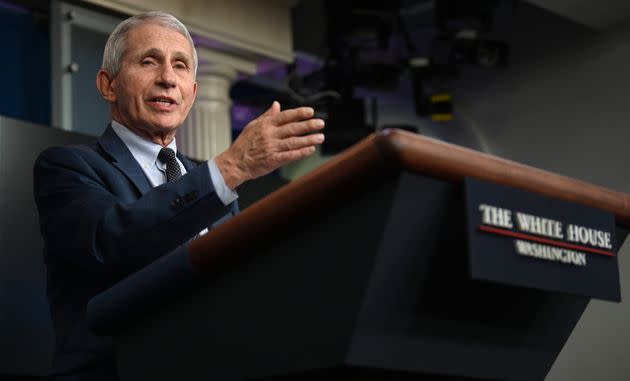Top Health Officials Share Optimism, Concern On Omicron Variant Of COVID
Dr. Anthony Fauci on Sunday said “the signals are a bit encouraging” as far as the severity of disease seen with the new omicron variant of the coronavirus, giving an optimistic projection while he and other health officials continued to urge Americans to remain vigilant as omicron COVID-19 cases are expected to rise in the U.S.
“Though it’s too early to really make any definitive statements about it, thus far, it does not look like there’s a great degree of severity to it,” Fauci, who serves as director of the National Institute of Allergy and Infectious Diseases, said in an interview with CNN’s “State of the Union.” “But we have really got to be careful before we make any determinations that it is less severe or it really doesn’t cause any severe illness comparable to delta.”
Fauci cited recent reviews of current COVID-19 cases in South Africa, where the omicron variant has quickly become the dominant strain after its discovery last month. Early reports have suggested that cases there have generally been more mild, though researchers have cautioned that there are still too many variables to consider before making a certain conclusion. These variables include South Africa having a relatively younger population that’s largely already been exposed to the virus, as Nature reported.

“You got to hold judgment until we get more experience,” Fauci said, while urging Americans to get fully vaccinated and get booster shots since plenty of unknowns remain.
“Even with a new variant like omicron, if you get boosted, you’re going to get your level up, way up, and we feel certain that there will be some degree, and maybe a considerable degree, of protection against the omicron variant, if, in fact, it starts to take hold in a dominant way in this country,” he said.
The Centers for Disease Control and Prevention has also said the variant likely spreads more easily than the original virus, based on its high number of mutations on the spike protein, which is the part of the virus that binds to a human cell and infects it.
CDC Director Dr. Rochelle Walensky emphasized Sunday that the variant’s complexity in mutations underscores the need for people to protect themselves, especially as cases in the U.S. are “likely to rise.” As of Sunday, there have been confirmed cases of the omicron variant in 16 states.
The number of omicron cases in U.S. is “likely to rise,” @CDCDirector Rochelle Walensky tells @MarthaRaddatz.
"What we don’t yet know is how transmissible it will be, how well our vaccines will work, whether it will lead to more severe disease." https://t.co/RalUtmlny0pic.twitter.com/vyIsLlz1M8— This Week (@ThisWeekABC) December 5, 2021
“We know from a vaccine standpoint that the more mutations a single variant has, the more immunity you really need to have in order to combat that variant, which is why right now we’re really pushing to get more people vaccinated and more people boosted to really boost that immunity in every single individual,” she said in an interview with ABC’s “This Week.” “We’re really hopeful that our vaccines will work in a way that even if they don’t prevent disease entirely, prevent infection entirely, that they can work to protect severe disease and keep people out of the hospital.”
But even if the variant is more mild than delta, that doesn’t mean there won’t be people who suffer, as epidemiologist Dr. Maria Van Kerkhove with the World Health Organization said Sunday.
“Some of those individuals will need hospitalizations. They will need to go into ICU and some people will die,” she said on CBS’s “Face the Nation.”
World Health Organization COVID lead @mvankerkhove tells @margbrennan initial reports suggest people with #Omicron have "mild" cases but cautions it's "still too early to tell" as cases cycle through patients. pic.twitter.com/lDrkaXMtRx
— Face The Nation (@FaceTheNation) December 5, 2021
As of Sunday, the virus has killed nearly 785,000 people in the U.S., according to the CDC. That’s more than the number of Americans killed by HIV and AIDS over the past four decades, according to the Kaiser Family Foundation.
“And so more cases can mean more hospitalizations. More hospitalizations could mean more deaths, and we don’t want to see that happen on top of an already difficult situation with delta circulating globally,” said Van Kerkhove.
In addition to preventing severe illness, getting enough people vaccinated globally will also help prevent the virus from mutating and creating yet another variant of concern, Dr. Francis Collins, director of the National Institutes of Health, said Sunday.
“That’s going to keep happening if we don’t have adequate immune protection across the globe,” he said in an interview with NBC’s “Meet the Press.” “We’re probably going to see something and we’ll have to use some of the other letters in the Greek alphabet.”
This article originally appeared on HuffPost and has been updated.

 Yahoo Movies
Yahoo Movies 